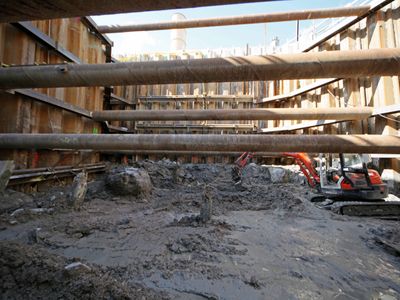This course encloses
- Basic characteristics
- Laboratory methods
- Effective stress concept
- Shear strength
- Consolidation
- Lateral earth pressure
- Bearing capacity
- Slope stability
- Risk management and dimensioning principles

The course encloses theoretical soil mechanics and principles for geotechnical design. The course also includes geotechnical laboratory methods.
KTH Campus
Spring 2026: P4 (7.5 hp)
50%
60176
Normal Daytime
Swedish
Places are not limited
Degree Programme in Civil Engineering and Urban Management, year 3, BBP
Degree Programme in Energy and Environment, year 3, MHI
Degree Programme in Energy and Environment, year 3, HSS
Degree Programme in Energy and Environment, year 3, RENE
Degree Programme in Energy and Environment, year 3, SMCS
Degree Programme in Energy and Environment, year 3, KEM
Degree Programme in Energy and Environment, year 3, MES
Degree Programme in Energy and Environment, year 3, SUE
Degree Programme in Energy and Environment, year 3, SUT
Degree Programme in Civil Engineering and Urban Management, year 3, MHI
Please note: all information from the Course syllabus is available on this page in an accessible format.
Course syllabus AF1601 (Spring 2026–)This course encloses
After completion of course the students should be able to:
- Define and use the basic concepts of Soil Mechanics, e.g. total and effective stress, pore water pressure, shear strength, elastic- and oedometer modulus
- Calculate the initial vertical stresses in a stratum and calculate the additional stresses from loading and from this analyze the oedometer process.
- Given a problem, chose proper soil mechanical model for the design of a construction.
- Analyze and design shallow foundations with respect to settlements and stability.
-Analyze and specify maximum allowed excavation depth and maximum slope inclination with respect to stability, hydraulic failure, and heave.
- Analyze, design and value embankments and slopes with respect to stability.
- Calculate the lateral earth pressures acting on earth retaining walls and sheet pile walls according to Rankine theory.
- Explain the principles for geotechnical risk management of the safety of geotechnical constructions.
- Execute and report a geotechnical routine- and CRS test on clay soil sample.
- Write a geotechnical design memorandum.
Given realistic problems, you will be exercised in modelling and solving problems, alone and as a member of a group. Your writing skills will be exercised from continuous feedback given on all written assignments. Corresponding English terminology will be presented during lecture and in literature.
Completed upper secondary education including proficiency in English.
at least 15 credits from SF1624 Algebra and Geometry and SF1910 Applied Statistics,
and at least 6 credits from AL1302 Geoscience and Geotechnical Engineering or AE1106 Geoscience.
Based on recommendation from KTH’s coordinator for disabilities, the examiner will decide how to adapt an examination for students with documented disability.
The examiner may apply another examination format when re-examining individual students.
If the course is discontinued, students may request to be examined during the following two academic years.
Written examination (TENA, 4,5 cr)
Exercises and laboratory work (ÖVNA, 3,0 cr) The written examination settles the grade of the course.